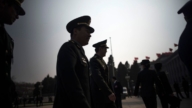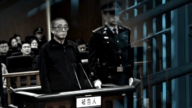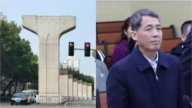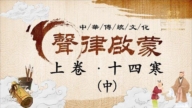【新唐人2013年10月08日讯】大陆作家、知名老右派——铁流,通过邮局直接寄给中共中央纪律检查委员会书记王岐山一封举报信,告发前中共常委李长春受贿千万元人民币卖官一事。铁流披露,在10年前的“中国书协”分会党组书记与主席的更换过程中,明显违反程序,北京文化界圈内人都知道是李长春收受贿赂的结果。请看报导。
铁流在举报信中写道,张飙先生于2000年2月从《科技日报社》总编辑位置,调到“中国书法家协会”,出任分党组书记兼驻会副主席时,不到55岁是书协最年轻的一把手。当时书协又穷又破,无车、无房管理松弛、人员淆乱,是任何官员都不愿意去的地方。可是在张飙的经营管理下,“书协”很快有新起色:会员剧增,收入过线。
按程式规定:“书协主席”最少任职时间应为两届,可以干到七十岁。可张飙一届还未到期,年龄未过五十九岁就被河南省书协主席张海取而代之。
据内部知情人告诉,是张海花了八百万元人民币,走了常委李长春的后门,再经中宣部长刘云山出面指压全国文联,硬把张飙拿下换上了张海。
铁流还表示,不久前,他从文化界一位有影响力的遗孀和几位字画商那里也了解到,张海的主席位置是花一千万元买的。
铁流相信,他的举报信肯定会引起很大的反响,这也是对中共总书记习近平提出的“大小老虎一齐打”、“摘去常委免死牌”新政的测试。
中国作家铁流:“王岐山一定会回,中纪委一定会回信的。我是实名制写的,留下我真名,电话都会留下的。”
铁流表示,捞上中国书协主席这个职位后,张海的字立即身价百倍,四平尺就可卖到三万元。
大陆诗人和文化评论家叶匡政指出,目前中国的书画艺术行情在看涨,与官场贪腐都是有联系的。现在附庸风雅的官员很多,导致很多地方流行所谓的“风雅贿赂”,经常用艺术品给官员送礼。
大陆诗人和文化评论家叶匡政:“一旦获得了书法家协会这种官位的话,他至少可以非常容易的得到,很多这种当下稍微有名气的书法家的作品,是很容易的。”
叶匡政表示,中国的官员群体巨大,每个县都有需求,所以半官方的书画团体官员就能非常容易获得大量金钱。
铁流在举报信中还写道,李长春劣迹斑斑,在河南做省委书记时就做了不少坏事,搞卖血发家,给河南省留下了爱滋病灾难﹔他的女儿李彤杖其权力,大搞私募基金﹔其兄长李长吉任大连建委领导期间,曾全力帮助大连正源房地产开发公司董事长富彦斌拿地皮、搞专案、争贷款,仅从大连沙河口区的“幸福家园专案”就使其盈利上亿元。
铁流还指出,李长春与薄熙来的关系非同一般,既有黑金往来,又有政治密谋,所以他支持重庆的“唱红打黑”。民间都知道,李长春无德无能,其上升提拔全靠拍江泽民马屁。
铁流认为,李长春政治上搞左倾、生活上堕落腐化、支持家族大搞权钱交易的勾当,用左的面目掩盖贪腐,用左的政治手段控制言论,打击迫害与自已不同观点的人。铁流希望中纪委认真彻查李长春卖官一亊。
北京宋庄画家追魂:“如果它真正调查事情的话,它这个系统就崩溃了。它只能让它烂在根里面,因为根子都烂了。”
北京宋庄画家追魂认为,中共独裁专制政权到了今天已腐朽透顶,官场有良知的人、敢说真话的就要下课,民间说真话的人则随时有坐牢的可能。因为中共为了保命,不顾一切常规、伦理。但任何挣扎都不能改变中共灭亡的下场。
采访/易如 编辑/宋风 后制/李勇
Tie Liu Wrote Wang Qishan, Exposing Li Changchun’s Corruption
Tie Liu, a Mainland Chinese writer who was labeled
as a rightist in the past, recently sent a letter to Wang Qishan,
Secretary of the central disciplinary department.
The letter reports on Li Changchun, former member of
Standing Committee, had gotten millions of dollars in bribes
for selling official positions.
Tie says that 10 years ago, the China Calligraphers Association
(CCA) changed its Party branch secretary
which obviously breached policy.
People in Beijing’s academic circles all knew
that it was because Li Changchun had taken bribes.
In his letter, Tie Liu exposed that in Feb. 2002, Mr. Zhang Biao
went from being chief editor for Science and Technology Daily
to taking office as the CCA’s vice chair and Party branch secretary.
The 55-year-old Zhang was the CCA’s youngest top leader.
The CCA was in dire straits at that time, with no cars,
no houses, loosened management and chaotic.
It was a place no official liked to go.
After Zhang Biao managed the CCA,
the situation improved quickly.
The CCA rapidly increased its membership,
bringing in huge revenue.
CCA policy states that chairman of the CCA should stay for
at least two election years, and can remain until the age of 70.
However, Zhang Biao had worked less than one election year,
and he was only 59 when he was replaced by Zhang Hai,
chair of the Henan Calligraphers Association.
Insiders say that Zhang Hai gave 8 million yuan ($1.3 million)
to Li Changchun, later Propaganda Minister Liu Yunshan
pressured the CCA to replace Zhang Biao with Zhang Hai.
Tie Liu also says that he was recently told by an influential
widow and some calligraphy businessmen,
that Zhang Hai spent 10 million yuan ($1.6 million)
to get his position as CCA chair.
Tie Liu says that his letter likely
would stir up heated responses.
It is also a test for Xi Jinping’s “beating big and small tigers
at once”, and “no exceptions to the death penalty
for Politburo Standing Committee members”.
Tie Liu: “Wang Qishan will certainly reply to me,
if not, the central disciplinary department would reply.
I signed my real name and left my phone number in the letter.”
Tie Liu says that after Zhang Hai became chair of the CCA,
his calligraphy was immediately worth a lot of money.
Four square feet of his work sold for 30,000 yuan ($4,900).
Ye Kuangzheng, poet and cultural critic in Mainland China,
says that the current the market price increases for calligraphy
and Chinese paintings is related to official corruption.
Now many officials are masquerading as lovers of culture,
resulting in so called “elegant bribery”.
Ye Kuangzheng: “Once he became CCA chairman,
then at the least it will be very easy for him to get artworks
by famous calligraphers and artists, it’ll be very easy.”
Ye said that there was huge population of officials in China,
each county has demands.
Thus officials in calligraphy industry can easily
obtain great amount of money.
Tie Liu’s letter wrote that Li Changchun was notorious.
Li committed many bad deeds during his tenure
as Henan’s provincial Party secretary.
He made a fortune from the “blood selling campaign”,
resulting in the “AIDS disaster” happening in Henan.
His daughter Li Tong relied on his influence
to carry out private fundraising.
His brother Li Changji, former Dalian construction committee
leader, helped Fu Yanbin, chair of Dalian-based developer
Rightway, to obtain “cheap” land and loans.
For example, Fu had made over one hundred million yuan
from a Happy Home Project in Shahehou District in Dalian.
Tie Liu points out that Li Changchun had
a unique relationship with Bo Xilai.
Both are connected to ill-earned money
and political conspiracy.
Thus Li Changchun supported Chongqing’s
“Singing Red songs, fighting corruption” campaign.
People know that Li Changchun is amoral and incompetent,
and his promotion had entirely relied on Jiang Zemin.
Tie Liu says Li Changchun took a leftist stance politically,
living in a corrupt life.
Li supported his family members by using his influence
to make a fortune.
He had covered up officials’ corruption, restricted
public expression, and persecuted his political opponents.
Tie hopes the central disciplinary department will investigate
Li Changchun on the issue of official positions selling.
Beijing artist Zhui Hun: “If the regime seriously carries
out the investigation, its system will collapse.
The regime can only let the problem continue to rot at it’s root,
as it has already rotten.”
Zhui Hun says that the Chinese Communist Party’s
authoritarian regime has reached its dead end row.
If officials with a conscience dare to talk honestly
they will be sacked.
Anyone who dares expose the truth
face the possibility of being jailed.
In order to survive, the CCP ignores all conventions and ethics.
However, none of the CCP’s struggles
can change its collapse in the end.



























